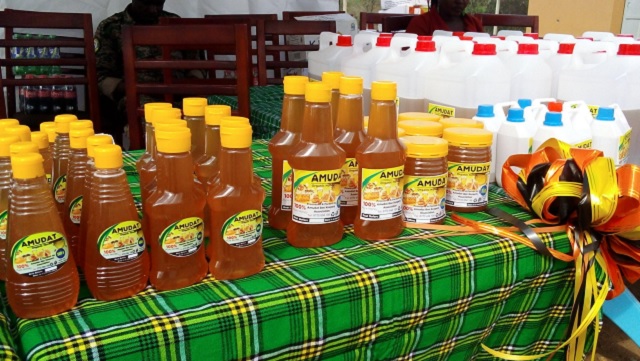
Amudat, Uganda | THE INDEPENDENT | Bee farmers in Amudat district are experiencing a significant increase in honey production, thanks to ongoing training in modern beekeeping techniques. Farmers credit their success to the skills they’ve acquired through various training programs, particularly those focusing on modern beekeeping practices such as using modified beehives, bee care, honey harvesting, processing, and proper storage.
These skills have significantly enhanced honey production in the region. Supported by the Development Initiative for Northern Uganda, farmers have also received essential equipment, including modern beehives, honey processing units, harvesting tools, and more. These resources have contributed to improved honey quality. Jonathan Angella, the chairperson of the Amudat Bee Farmers Association, emphasized the positive impact of modern beekeeping on honey production.
He noted that training and the use of provided tools have enabled them to increase their honey production. Before acquiring these skills, honey production was low, and the quality was poor, with limited market access. With modern beekeeping practices, farmers can now harvest between 3 and 4 tons of honey in a single season, and there are four harvesting periods in a year.
Judith Chelengat, a bee farmer from Looro Sub County, shared her experience. She used to produce low-quality honey that sold at low prices, often struggling to identify the right harvesting season. With the knowledge gained from training, she now earns significant profits, approximately two to three million shillings per season and eight million Shillings annually.
Chelengat also highlighted the value of exchange visits to other districts with successful honey production centers, which provided additional knowledge.
Gloria Apio, the Amudat District Principal Entomologist, explained that they organized bee farmers into groups after realizing that honey sales were not profitable individually. Most of their honey was sold to Kenyan factories at lower prices and branded as West Pokot honey, without recognition of its source in Amudat district. Under the umbrella of Amudat bee farmer groups, they now produce honey collectively to avoid exploitation by Kenyan buyers.
Support from development partners has significantly boosted honey production, and they are exploring packaging options to enter the global market. Public-private partnerships are also on the horizon to enhance international competitiveness. Furthermore, plans are underway to expand hive products such as beeswax, candles, propolis, and more, with certification from the Uganda National Bureau of Standards in mind.
Amudat district has also received a fully equipped honey processing facility from the Development Initiative for Northern Uganda (DINU) as part of their projects, including roads and livestock markets, funded through the United Nations Capital Fund.
Jennifer KabukoKhe, Deputy Director of the United Nations Capital Fund, praised the successful implementation of these projects in Amudat district. She encouraged the district government to maintain these facilities and promote local economic development among the communities.
Currently, there are over 3,172 bee farmers organized into 173 Associations under the umbrella of Amudat district Cooperative Society.
*****
URN
 The Independent Uganda: You get the Truth we Pay the Price
The Independent Uganda: You get the Truth we Pay the Price



